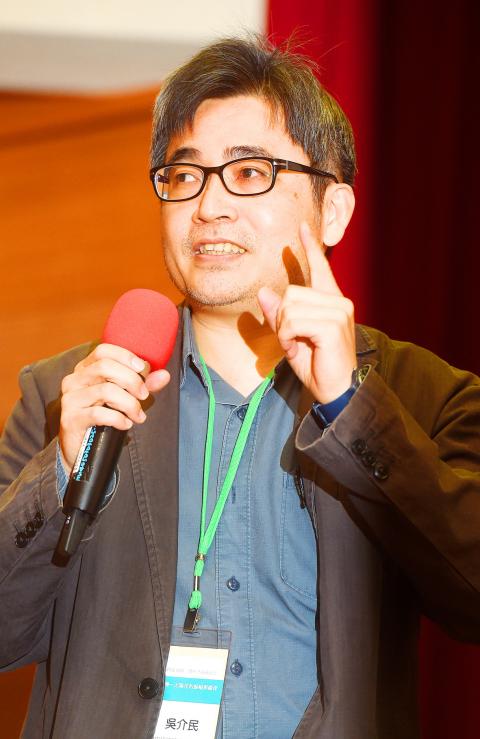Two Taiwanese academics who planned to attend an academic conference in Hong Kong on Wednesday have been denied visas to the territory.
Wu Jui-jen (吳叡人) and Wu Chieh-min (吳介民) are associate research fellows at Academia Sinica’s Institute of Taiwan History and Institute of Sociology respectively, and had been invited by the Hong Kong Federation of Students (HKFS) to attend an academic conference discussing the colonization of Hong Kong from the period of British rule to the age of being a special administrative region from different academic angles, a statement on HKFS’ Facebook page said.
Fu Jen Catholic University law professor Wu Hao-jen (吳豪人) was also invited to the conference and had been granted a visa, but has decided not to attend in protest of the Hong Kong government’s unreasonable denial of the other two academics’ entry, HKFS wrote in the statement.

Photo: Chien Jung-fong, Taipei Times
This shows that China more intricately understands the connections and exchanges between Taiwan and Hong Kong, and that China’s control over the territory is increasingly strict, Wu Jui-jen said.
After the “Umbrella movement,” Hong Kong’s younger generation attempted to regroup and hopes to be able to reorganize the localization movement and pro-independence ideas to establish a new discourse, Wu Jui-jen said.
This might have made the Chinese Communist Party (CCP) nervous, leading the party to suppress and block academic exchanges between Taiwan and Hong Kong to “prevent Taiwan from continuing to pollute Hong Kong,” Wu Jui-jen said.
China’s control over Hong Kong has expanded from public exchanges between social movement figures to private academic events, Wu Jui-jen said, adding that he and others no longer have an “optimistic illusion” about the situation in Hong Kong.
When interactions between Taiwan and Hong Kong turn from two-way to one-way exchanges, Taiwan must reconsider its own position, Wu Jui-jen said.
A large-scale partnership between Taiwan and Hong Kong is increasingly unlikely, Wu Jui-jen said.
As an important nation that represents democracy in the East Asian region, Taiwan should develop a new partnership model with Hong Kong, Wu Jui-jen added.
This is the CCP blocking contact between Taiwan and Hong Kong from all directions, National Cheng Kung University political science professor Leung Man-to (梁文韜), who is from Hong Kong, said in an interview.
Anyone who supports Hong Kong’s protest movements might be added to the CCP’s blacklist, Leung said.
Taiwan Thinktank researcher Tung Li-wen (董立文) said that China’s control over Hong Kong has become increasingly strict.
Under this oppression, Taiwan could possibly become the next overseas base for Hong Kong’s protest movements, Tung added.
In July, National Taiwan University sociology professor Ivan Ho (何明修) faced difficulty trying to attend an academic conference in Hong Kong and was only able to receive a visa after a series of complications.
In the past, it was “understandable” that participants of the Sunflower movement could not enter Hong Kong, Ho said in an interview.
However, Beijing is making it difficult for people to attend academic conferences, Ho said, adding that he believes that the Chinese government’s surveillance network might have been expanded.
General Association of Chinese Culture deputy secretary-general Chang Tieh-chih (張鐵志) was also denied entry to Hong Kong earlier this month.

AIR SUPPORT: The Ministry of National Defense thanked the US for the delivery, adding that it was an indicator of the White House’s commitment to the Taiwan Relations Act Deputy Minister of National Defense Po Horng-huei (柏鴻輝) and Representative to the US Alexander Yui on Friday attended a delivery ceremony for the first of Taiwan’s long-awaited 66 F-16C/D Block 70 jets at a Lockheed Martin Corp factory in Greenville, South Carolina. “We are so proud to be the global home of the F-16 and to support Taiwan’s air defense capabilities,” US Representative William Timmons wrote on X, alongside a photograph of Taiwanese and US officials at the event. The F-16C/D Block 70 jets Taiwan ordered have the same capabilities as aircraft that had been upgraded to F-16Vs. The batch of Lockheed Martin

US President Donald Trump yesterday announced sweeping "reciprocal tariffs" on US trading partners, including a 32 percent tax on goods from Taiwan that is set to take effect on Wednesday. At a Rose Garden event, Trump declared a 10 percent baseline tax on imports from all countries, with the White House saying it would take effect on Saturday. Countries with larger trade surpluses with the US would face higher duties beginning on Wednesday, including Taiwan (32 percent), China (34 percent), Japan (24 percent), South Korea (25 percent), Vietnam (46 percent) and Thailand (36 percent). Canada and Mexico, the two largest US trading

GRIDLOCK: The National Fire Agency’s Special Search and Rescue team is on standby to travel to the countries to help out with the rescue effort A powerful earthquake rocked Myanmar and neighboring Thailand yesterday, killing at least three people in Bangkok and burying dozens when a high-rise building under construction collapsed. Footage shared on social media from Myanmar’s second-largest city showed widespread destruction, raising fears that many were trapped under the rubble or killed. The magnitude 7.7 earthquake, with an epicenter near Mandalay in Myanmar, struck at midday and was followed by a strong magnitude 6.4 aftershock. The extent of death, injury and destruction — especially in Myanmar, which is embroiled in a civil war and where information is tightly controlled at the best of times —

China's military today said it began joint army, navy and rocket force exercises around Taiwan to "serve as a stern warning and powerful deterrent against Taiwanese independence," calling President William Lai (賴清德) a "parasite." The exercises come after Lai called Beijing a "foreign hostile force" last month. More than 10 Chinese military ships approached close to Taiwan's 24 nautical mile (44.4km) contiguous zone this morning and Taiwan sent its own warships to respond, two senior Taiwanese officials said. Taiwan has not yet detected any live fire by the Chinese military so far, one of the officials said. The drills took place after US Secretary